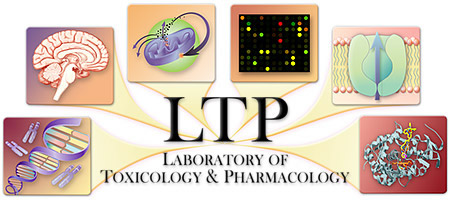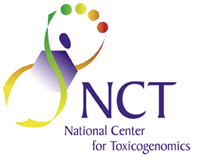Toxicology & Pharmacology Laboratory
Research Summary
The Laboratory of Toxicology and Pharmacology (LTP) utilizes the approaches and techniques of pharmacology, physiology, biochemistry, and molecular biology to study the mechanisms by which environmental factors interact with and influence critical biological processes. Research groups within the Laboratory focus on:
- Molecular responses to environmental stress and the impact of those mechanisms on the development and progression of injury and disease
- Processes that determine the disposition of environmental chemicals within the body, including metabolism and transport
- Mechanisms responsible for the toxic effects of xenobiotics and their metabolites including those based on free radical formation and inflammation
- Altered cellular signaling induced by heavy metals, studied using genetic tools in model organisms, for example, C. elegans
- Mechanisms of toxicity resulting from inhalation exposure to environmental chemicals
- Development of mathematical tools and models to integrate multiple endpoints — such as dosimetry, genomics, proteomics — and better understand the consequences of exposure to toxic agents

The NIEHS Microarray Core operates out of LTP and supports genetic and genomic aspects of research conducted throughout the Division of Intramural Research (DIR) and the National Toxicology Program (NTP).
David S. Miller, Ph.D., is Chief of the Laboratory of Toxicology and Pharmacology and head of the Intracellular Regulation Group within the Laboratory. LTP also provides a focus within NIEHS for the use of alternative model systems from comparative and marine biology to study the pharmacology and toxicology of xenobiotics.
For more information about research, training opportunities or the institutional roles of this Laboratory, please contact Dr. Miller.
Scientific Support Staff
-
Diane Wilson
Administrative Specialist -
Tel (919) 541-3197
Fax (919) 541-5737
wilson24@niehs.nih.gov
-
Judy Bartz
Administrative Technician -
Tel (919) 541-4895
Fax (919) 541-5737
bartzjl@niehs.nih.gov

For continuation of the research activities conducted by the National Center for Toxicogenomics (NCT), please see the following web pages:
- Environmental Stress and Cancer Group ("/Rhythmyx/assembler/render?sys_contentid=54476&sys_revision=1&sys_variantid=1278&sys_context=0&sys_authtype=0&sys_siteid=&sys_folderid=" sys_dependentvariantid="1278" sys_dependentid="54476" inlinetype="rxhyperlink" rxinlineslot="103" sys_dependentid="54476" sys_siteid="" sys_folderid=""), headed by Richard Paules, Ph.D.
- Chemical Effects in Biological Systems (CEBS) ("/Rhythmyx/assembler/render?sys_contentid=32946&sys_revision=11&sys_variantid=639&sys_context=0&sys_authtype=0&sys_siteid=&sys_folderid=" sys_dependentvariantid="639" sys_dependentid="32946" inlinetype="rxhyperlink" rxinlineslot="103" sys_dependentid="32946" sys_siteid="" sys_folderid="")
The National Center for Toxicogenomics (NCT) investigations initiated in Toxicology/Pathology are continuing in the Laboratory of Toxicology & Pharmacology Environmental Stress and Cancer Group.

